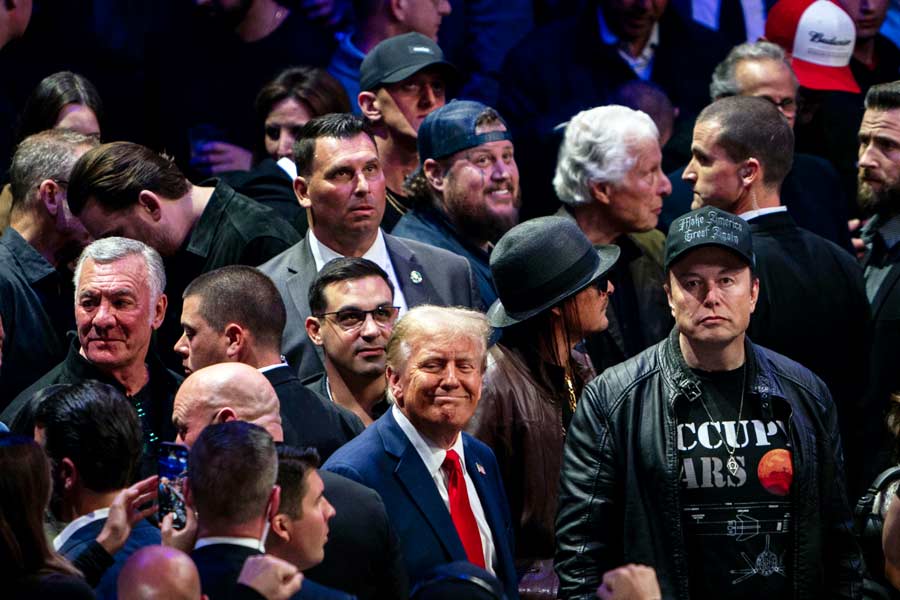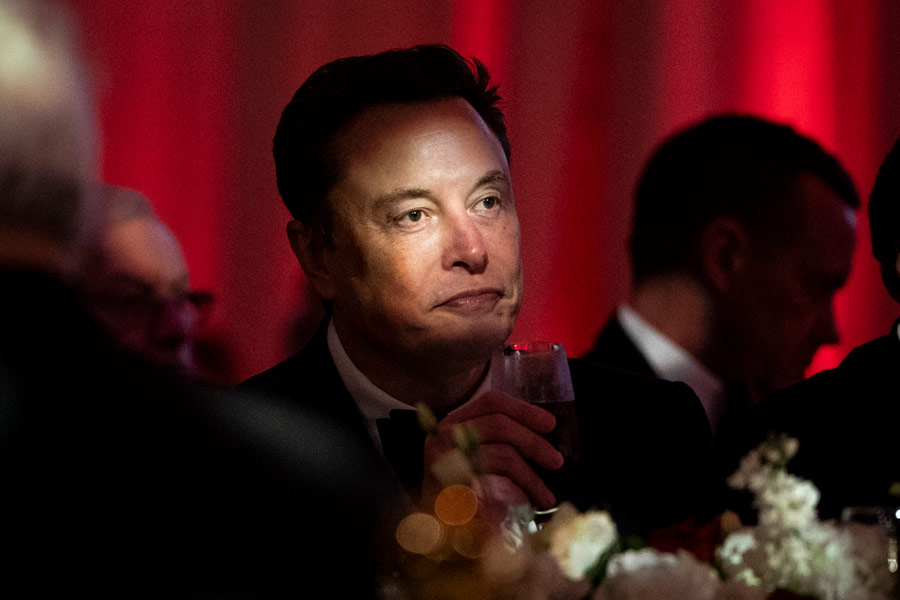For the first 53 years of his life, Elon Musk barely spent any time with Donald Trump. Then, beginning on the night of Nov. 5, he spent basically no time without him.
And so Musk, more than any other key player in the presidential transition, finds himself in a cram session to learn the courtier politics of Trump’s inner circle. For the world’s richest person — not known for his humility or patience — it is a social engineering challenge far trickier and less familiar than heavy manufacturing or rocket science.
Doubts abound as to whether he will graduate in 2028 with a four-year degree in Trumpism: It is now a parlor game in Washington and Silicon Valley to speculate just how long the Musk-Trump relationship will last. The answer, as discarded aides from Trump’s first term will tell you, may depend on Musk’s ability to placate the boss and keep a relatively low profile — but also to shiv a rival when the time comes.
In short, how to play the politics of Trumpworld.

President-elect Donald Trump, center, with Elon Musk, right, during UFC 309 at Madison Square Garden in New York on Nov. 16, 2024. (Al Drago/The New York Times)
Most of the people who now surround Trump in the transition are battle-tested aides from his past fights, or decades-long personal friends. Musk is neither. What he brings instead are his 200 million followers on social platform X and the roughly $200 million he spent to help elect Trump. Both of those have greatly impressed the president-elect. Trump, gobsmacked by Musk’s willingness to lay off 80% of the staff at X, has said the tech billionaire will help lead a Department of Government Efficiency alongside Vivek Ramaswamy.
Over the last week, Musk has kept up his buddy routine with Trump, joining him at nearly every meeting at Mar-a-Lago as well as a UFC fight. On Tuesday, he brought the president-elect to the Rio Grande Valley in Texas for a SpaceX launch.
In private meetings at Mar-a-Lago, Musk shows little familiarity with policy or the potential staff members being discussed, but he returns repeatedly to a central point: What is required, he says, is “radical reform” of government and “reformers” who are capable of executing radical changes, according to two people briefed on the meetings, who insisted on anonymity to describe the internal conversations.
On Wednesday, Musk, who often criticizes the mainstream news media, wrote an essay in The Wall Street Journal with Ramaswamy that detailed more of their plan for the new agency they call DOGE.
Musk has not been particularly aggressive about pushing his preferred names for administration roles. But his tech-world orbit is emboldened and widely seen as influential.
Mick Mulvaney, who served as Trump’s second chief of staff and now works at a lobbying firm, Actum, has told clients that tech executives are likely to have extraordinary access.
“Elon Musk, Marc Andreessen, David Sacks, Joe Lonsdale and other tech leaders are influencing Trump’s preparations for his second term, something which no other business leaders have been able to do at this level in past presidential elections,” reads a presentation shared by Mulvaney with clients, which was seen by The New York Times.
But Mulvaney, a former director of the Office of Management and Budget, has sounded skeptical about Musk’s ability to deliver on his promised budget cuts.
He recently told clients on a call with about 70 people that Musk would find out that “going to Mars is easier,” according to a person who was listening and described the call. Mulvaney, the person added, said that he did not envision a wholesale change of how the federal government did business and that he doubted Musk would stick around to actually get it done.
The tech leaders whom Mulvaney highlighted are indeed firmly in the transition conversation.
Several friends of Musk’s have been spotted at Mar-a-Lago in recent days, including Andreessen, Lonsdale and Ken Howery. Lonsdale, a founder of Palantir, has told peers that he was being considered for multiple roles, including secretary of education, but that he declined to move forward, wanting to stick to his business career and private philanthropy. Sacks, another friend of Musk’s, has also been involved in the Trump transition, joining calls and spending time at Mar-a-Lago in recent days, according to two people briefed on his activities.
Other tech executives have been scrambling to broker introductions to Musk or his proxies. Across Silicon Valley, interest in serving in the Department of Government Efficiency is high. Brian Armstrong, the CEO of Coinbase, described that work on social media this week as “a once in a lifetime opportunity to increase economic freedom in the U.S. and cut the size of government back to health.” Musk has been canvassing friends for their interest in formal administration roles, according to a person briefed on his outreach.
Musk successfully pushed for Brendan Carr, a Republican, to be picked to lead the Federal Communications Commission — a “great choice,” the billionaire wrote after the announcement — although Carr had always been seen as the favorite. And Musk has pushed Trump to bring back Russell Vought, another budget director in Trump’s first term, according to a person briefed on the matter.
But Musk’s early record also has its blemishes. He pushed for Emil Michael, a former top Uber executive, to be the next transportation secretary, only for Michael to lose out to Sean Duffy, a former member of Congress from Wisconsin. Duffy was backed by Susie Wiles, who will become Trump’s chief of staff in January, and Reince Priebus, the president-elect’s onetime chief of staff, according to a person briefed on the process.
Musk also made a very public push for Trump to choose Howard Lutnick, the CEO of Cantor Fitzgerald, as his Treasury secretary. The president-elect ultimately declined, instead picking Lutnick for commerce secretary. And Musk was a vociferous defender of former Rep. Matt Gaetz of Florida, who on Thursday withdrew as Trump’s pick for attorney general.
Trump’s aides are divided on Musk’s role. Some see him as relatively harmless, and he is close with Stephen Miller, a top policy aide. Others have chafed at his near-constant presence at Mar-a-Lago, especially given his lack of personal history with Trump.
So it is notable that Musk has appeared concerned about the perception of his influence. On Wednesday, in response to a headline describing him as Trump’s “closest confidant,” the tech billionaire went out of his way to praise “the large number of loyal, good people at Mar-a-Lago who have worked for him for many years.”
“To be clear, while I have offered my opinion on some cabinet candidates, many selections occur without my knowledge and decisions are 100% that of the President,” he wrote on X.
It appeared to be a recognition of a well-known lesson in Trumpworld: Don’t outshine the boss. At least if you want to stay awhile.
Mulvaney’s advice for Musk? Be a straight shooter with Trump, because “there are plenty of people who will feel the need to agree with him all the time.”
“What makes Musk such a valuable adviser,” Mulvaney told the Times in an interview, “is that he has enough money — and enough other things to do — that he is uniquely situated to be the bearer of honest news. More than perhaps anybody else on the planet, he doesn’t need the job.”
The New York Times News Service











